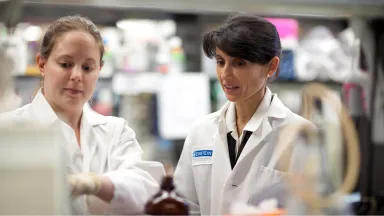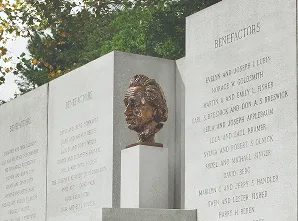
Roy S. Chuck, M.D., Ph.D.
- Professor, Department of Ophthalmology & Visual Sciences
- Professor, Department of Genetics
- Chair, Department of Ophthalmology & Visual Sciences
- Paul Henkind Chair in Ophthalmology, Department of Ophthalmology & Visual Sciences
Area of research
- corneal spectroscopy , surgical device development , clinical trials
Phone
Location
- Montefiore Medical Center Medical Arts Pavilion 3400 Bainbridge Avenue Bronx, NY 10467
Research Profiles
Professional Interests
Dr. Roy S. Chuck is an ophthalmologist, visual scientist and geneticist known for his stem cell and dry eye research, and work in corneal restoration. He chairs Einstein’s department of ophthalmology and visual sciences, one of only a handful of Asian-Americans to hold such a post in the U.S.
He also chairs the ophthalmology department at Montefiore Medical Center, overseeing tertiary care to adult and pediatric patients with diseases of the eye, with subspecialty expertise that includes neuro-ophthalmology, plastic surgery, and retina, cornea and glaucoma services. The department maintains a program of ongoing community outreach aimed at early detection and treatment of eye diseases.
Dr. Chuck is a cornea specialist with expertise in laser techniques for refractive eye conditions. He has deep research experience and holds multiple patents. His two main areas of research are corneal stem cell surgery and dry eye, the most common global eye disease. Recently, Dr. Chuck's team developed a unique mouse model of dry eye that allows animal testing of therapies. The model employs the use of botulinum toxin, commonly known as "botox," to block neurotransmitters in the tear-producing lacrimal gland. The resulting dry eye closely mimics that found in humans.
Dr. Chuck is a long-time stem cell investigator in connection with corneal transplantation and sight restoration. His work includes cutting-edge corneal stem cell surgery, which has a success rate of nearly 50-percent—one of the highest for stem cell surgery. The operation is performed if the stem cell pool on the eye is wiped out through injury or a genetic condition. Without these regenerating cells, eye injuries, however small, result in opaque scars that reduce or even eliminate vision. Corneal stem cell surgery requires removing the scar tissue and transplanting donated corneal stem cells onto the eye. If successful, the introduced stem cells heal the wound and vision is restored.
At Einstein, Dr. Chuck is developing research centers focusing on ophthalmologic disorders including cataracts, ocular surface disease/dry eye, glaucoma, macular degeneration, and eye conditions associated with diabetes.






